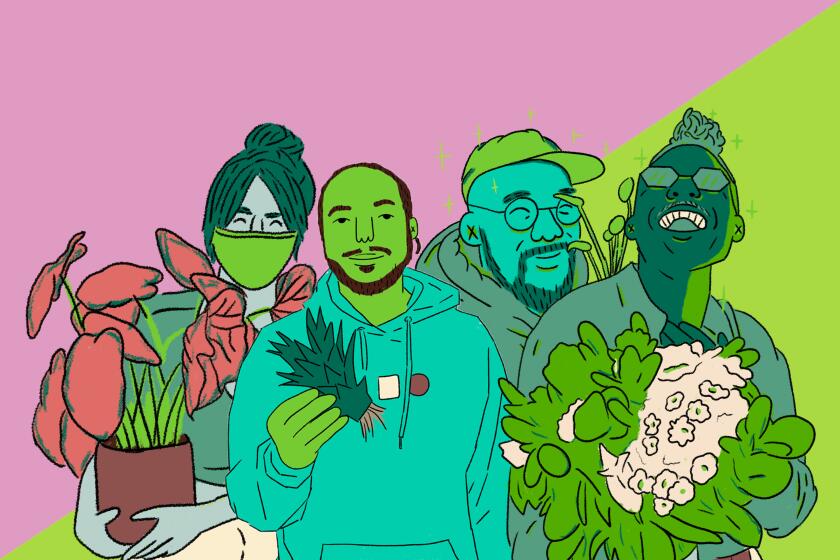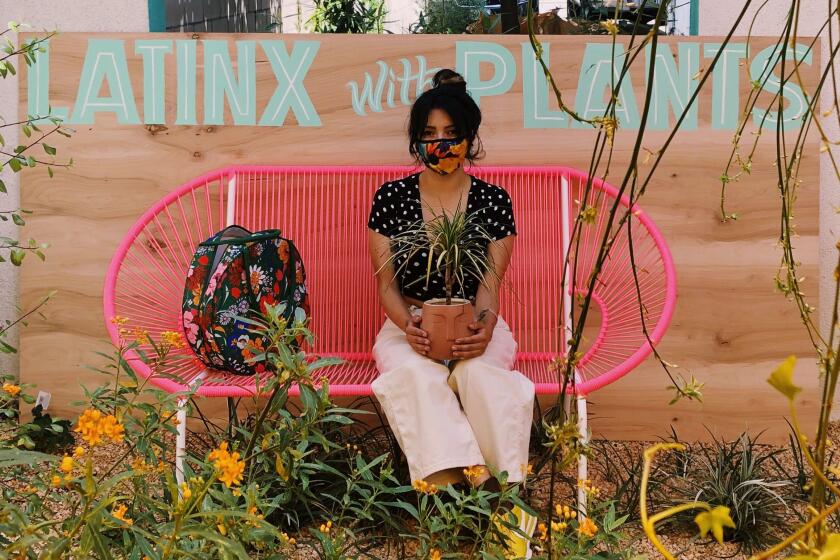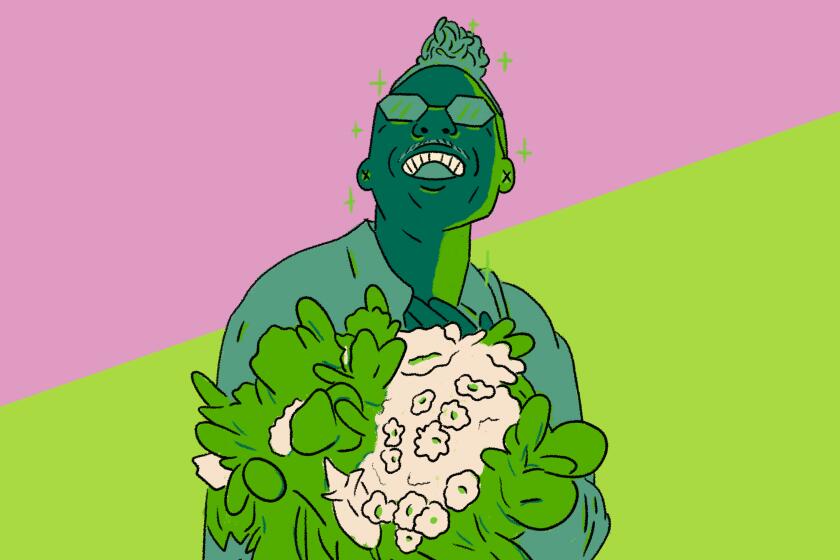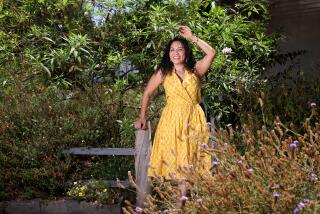This farmer in Pomona will inspire you to plant your own garden, no matter how small
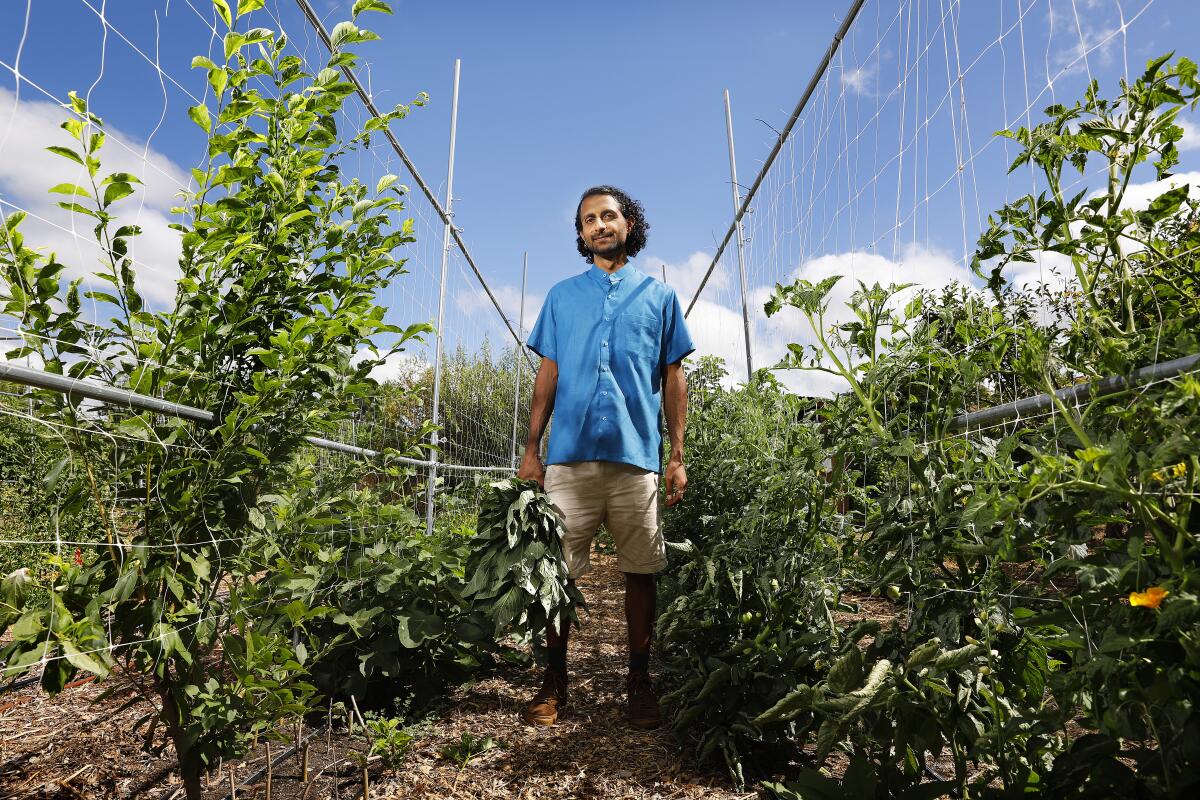
- Share via
This is the latest in a new series we call Plant PPL, where we interview people of color in the plant world. If you have any suggestions for PPL to include in our series, tag us on Instagram @latimesplants. This interview has been lightly edited for length and clarity.
Over the last 10 years, Rishi Kumar has transformed dirt plots and water-guzzling lawns into thriving gardens and farms.
At his parents’ home in Diamond Bar, where Kumar grew up, he planted more than 80 fruit trees that yield thousands of pounds of produce every year and use half the water as a typical lawn. The suburban home has become a refuge for bees, butterflies and a regular chorus of birds.
In Claremont, he replaced a lawn with a garden full of trees and native California vegetation, in exchange for harvesting the fruit and using the space for educational purposes. Spring brings a bloom of California poppies and other wildflowers to the garden, which uses 80% less water now.
And in Pomona, he turned a half-acre dirt plot into a farm and an organic nursery of fruit trees, vegetables and medicinal herbs, where visitors can pick and buy fruit and shop for plants — by appointment.
It’s hard to believe that Kumar, 31, is largely self-taught; he studied computer science in college. When he got tired of looking at a screen and got curious about food, he spent a summer at a rural farm in northern India. The visit proved life-changing, introducing him to ecological approaches as well as the sheer beauty and hard work of agriculture.
Get The Wild newsletter.
The essential weekly guide to enjoying the outdoors in Southern California. Insider tips on the best of our beaches, trails, parks, deserts, forests and mountains.
You may occasionally receive promotional content from the Los Angeles Times.
Today, he owns his farm in Pomona and shares what he’s learned over the years through demonstrations, workshops and tips on Instagram, where he has nearly 14,000 followers. That’s one way he’s managed to stay afloat in a challenging profession.
“A lot of people I know just get wrecked by the constant challenges, financial instability or even land instability,” he said. “People lose their farms after a couple of years putting a lot of love into them. Anyone who does it does it out of pure love.”
In our Plant PPL series, we interview people of color in the plant world, including plantfluencers, plant stylists, floral artists, enthusiasts, experts and garden store owners.
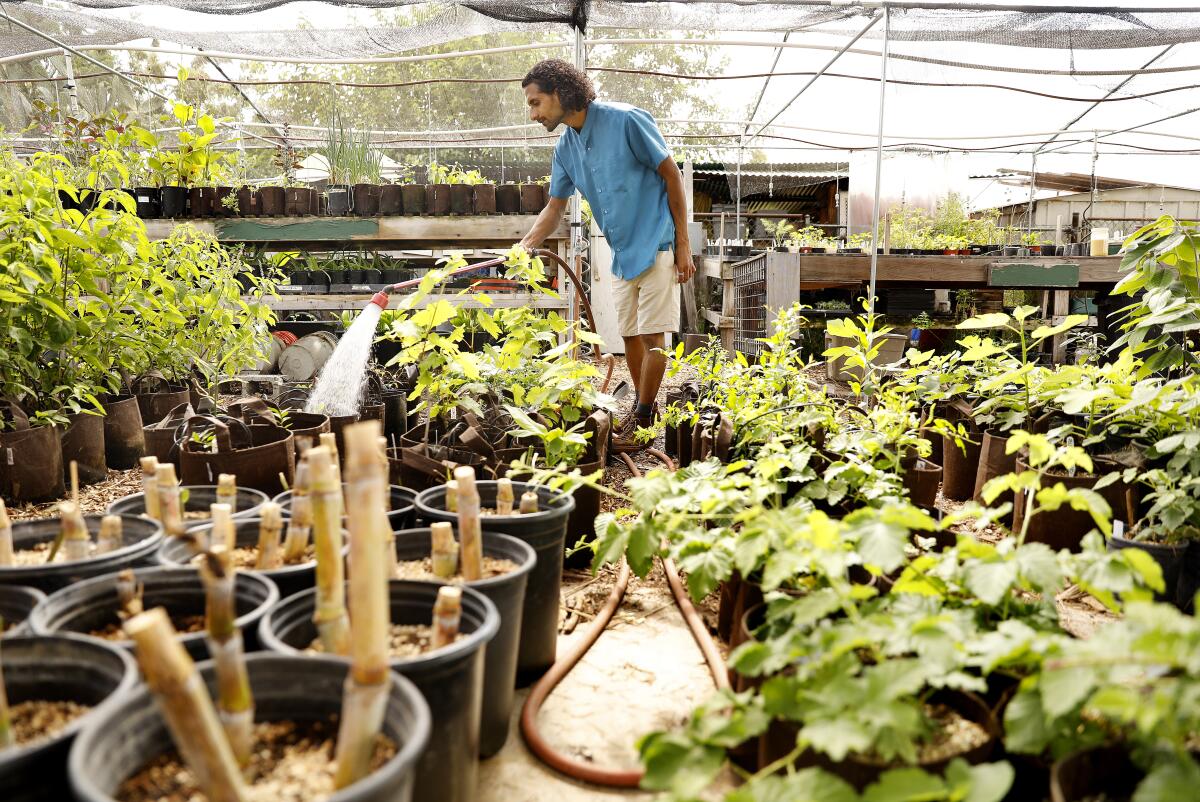
What can gardening do for us right now?
People are looking for grounded experiences especially right now, and I think gardening is a very powerful form of therapy.
When you’re in a garden and you see, “Hey, the healthier this kale plant is, the more nutrition I’m going to be eating,” it very clearly starts to show you that how you care for someone else, how you care for this plant is directly tied to your own health. Gardening shows you all this in a really tangible, physical way that not a lot of other things do. It’s such an important way of connecting with the earth, connecting with ourselves and eating well.
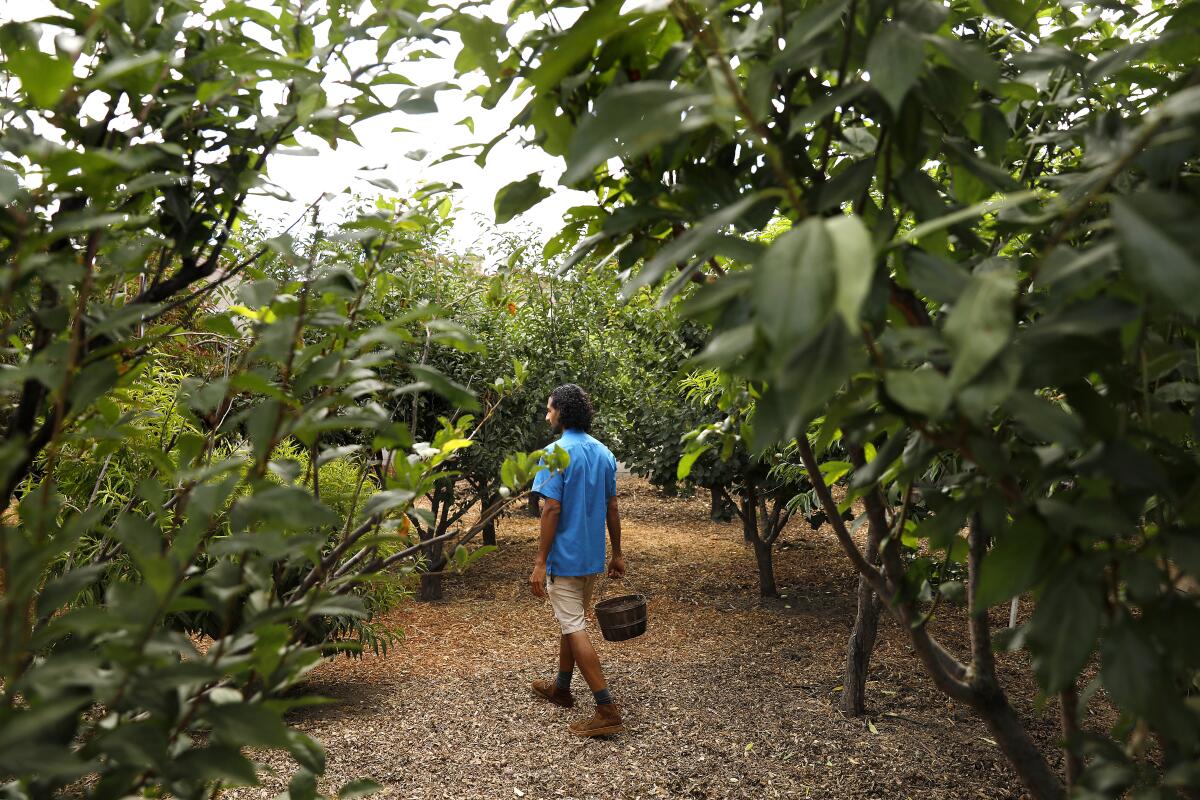
What can people find at your farm in Pomona?
We have a huge selection of fruit trees, medicinal plants, culinary herbs and perennial vegetables. Recently, we’ve been doing you-pick-fruit at the farm with mulberries, apricots, plums and strawberries. We sell plants at our nursery.
We try to focus on plants that will give people food to eat from their garden without a lot of effort. Most of the time when people think [of] gardening, they think vegetable gardening. But growing vegetables is the most difficult way to grow your food. Vegetables take the most time, the most care, the most attention. We focus a lot on fruit trees for that reason. We also focus on plants called perennial vegetables, which means you plant it once, and then it’s going to be giving you food for three, four, five, even 10 to 15 years. Examples of perennial vegetables are tree collards, New Zealand spinach, walking onion and garlic chives.
Also, I’m a big fruit fanatic. I have a collection of just amazing fruits, and in my head I call my nursery “tier-one fruits,” like these are the best fruits.
Andi Xoch, creator of @LatinxWithPlants hosts plant pop-ups on the weekends outside her home in Boyle Heights
What’s included in the tier-one fruits?
Pomegranates, figs, guavas, dragonfruits, sugarcane. Mangoes, bananas. Not like store-bought bananas but small ones. We have a couple different mango varieties that are all Indian heritage, but they’ve been interbred in Florida.
And then we actually have one variety of our own. My mom planted this mango seed eight years ago, just from a mango from the store.
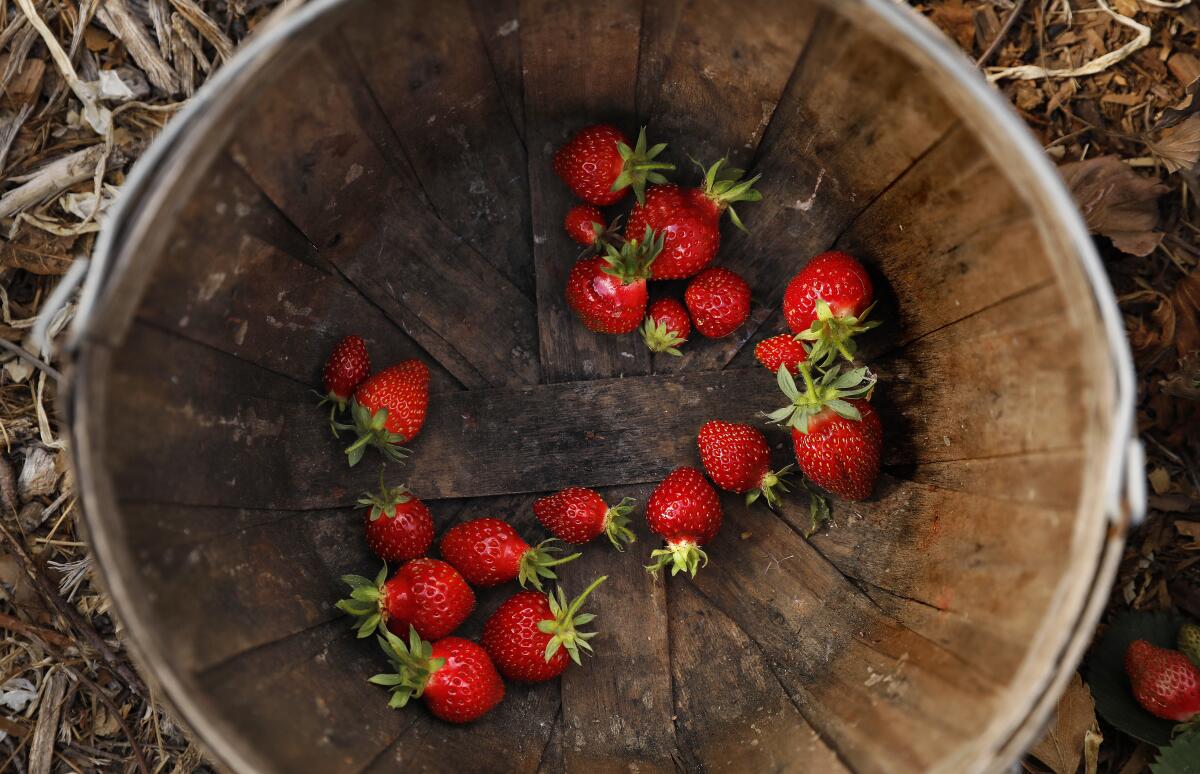
When you grow a fruit from seed, the tree that comes up is not the same as the fruit that you sow, just like you’re not exactly like your parents. It’s something new and unique. Most people don’t grow fruit trees from seed, because you don’t know the exact fruit you’re going to get.
“Gardening is one of the most important professions of care. It’s someone who cares for plants, who cares for soil, and through that, is caring for people.”
— Rishi Kumar
But my mom planted the seed, and it came up. At first, I didn’t pay very much attention to it. Then last year, after eight years, it produced fruit. We got these big, beautiful mangoes with yellow, red, peach skin and super golden flesh. They smelled so good and turned out incredible. So we named it California Gold, and I’m working on propagating it now.
What’s your best advice for a beginner home garden?
First of all, anyone can start a garden in any situation. There are plants that can survive without ever needing sunlight. My bathroom plants — pothos, aloe vera, dracaena — never get anything but electrical light, and they love it.
Christopher Griffin has built an Instagram following of more than 180,000 with an infectious smile and community building through plants.
You can also start composting some of your food scraps at home. We have this idea of waste, that whatever you don’t eat is trash. But when you take that food waste and you say, “OK, that’s not waste. This is a gift. And I’m going to give the gifts of my leftovers to my worms, and my worms are going to eat up my leftovers. They’re going to create another gift called worm compost. And I’m going to feed this worm compost to my potted kale plant. My kale plant is going to grow healthier and give me food,” you’re starting to see that there’s this cycle of gifts. There’s this gift economy that is there, that we have not understood. It’s actually really easy to tap back into that.
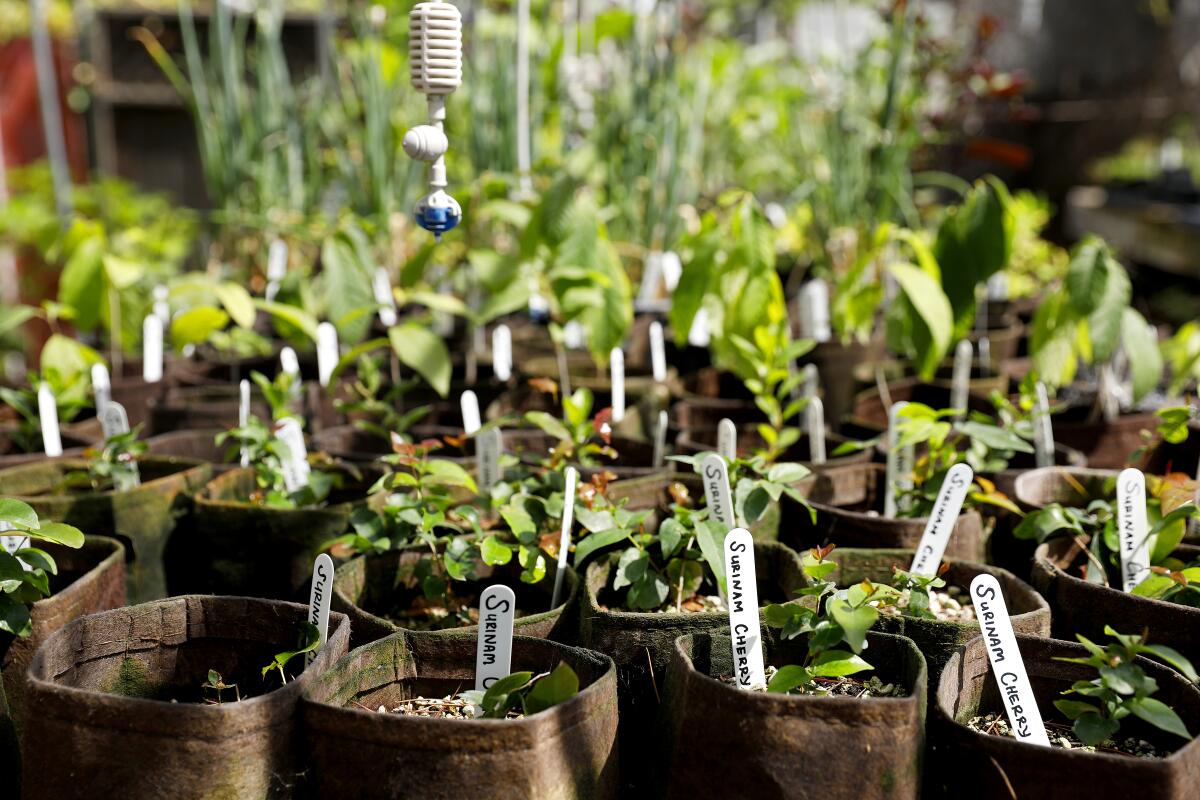
OK, I’m convinced. So, what’s something easy to plant in a small space?
Fresh herbs that you can put into anything you’re cooking, like oregano or basil. I have a Chinese vegetable at my nursery called garlic chives. They’re like onion chives, but they taste like garlic. This is one of the easiest plants on earth to grow, and you can add that garlic flavor into any of your foods. You could grow leafy greens: kale, Swiss chard, tree collards. If you have like five or six pots, you could grow all of these plants and have something to add to any meal that you’re having.
What about for outdoor gardens?
I recommend two plants for everyone to grow right now. Plant an African blue basil. This is a basil that flowers all year. And it’ll bring the honey bees to your garden, wherever you are. And then I would plant the California native milkweed, which is a white flowering plant, with beautiful white flowers. And that is the host plant for monarch butterflies in Southern California.
Your parents were raised in India, and you were born and brought up in the United States. What did you learn about farming in India when you visited?
When I went to the farm, I had never really spent too much time in rural India. It was eye-opening. I would wake up and open the door, and there’d be a line of frogs sitting under the door. One time I came into the room, and there was literally a frog sitting on my bed. There were mango orchards, and we were working on the rice fields. I learned to plow a field with oxen.
It was a completely different world than I ever experienced, seeing how hard people work physically, doing intense physical labor. It was crazy to see the amount of effort it takes to grow a bag of rice or a bag of lentils. You’d have to sit there for an entire day and sift through a bag of rice or lentils by hand to make sure there’s no rocks, stones or insects.
It was a lot of fun too. We would pile up a mountain of straw, go up on the building next to it and jump off the building into the straw. It’s hard work, but you’re always surrounded by beauty. And occasionally, you get to do super fun things.
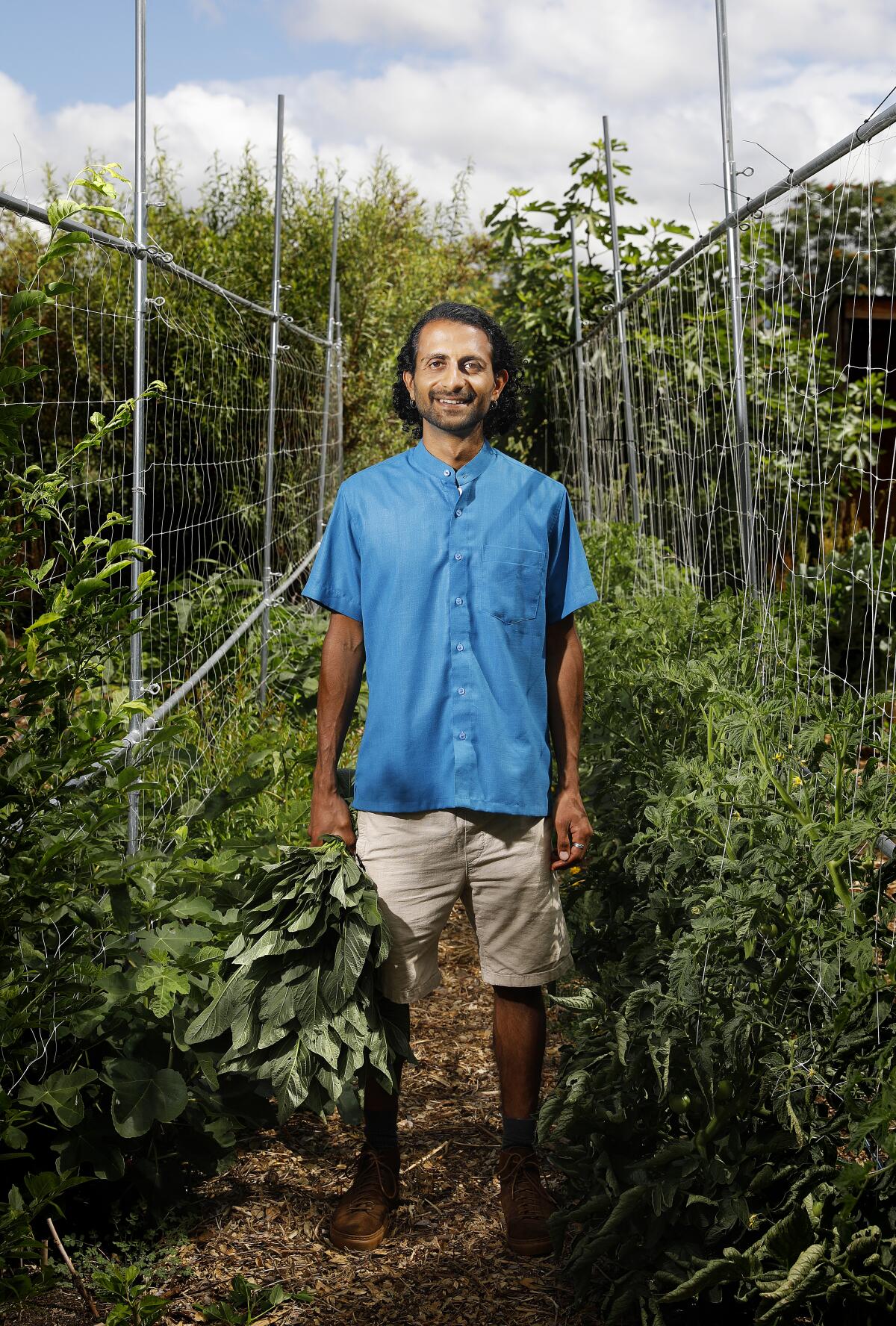
How does being Indian and having that identity inform your work?
For me, I think an important part of colonization for the colonizer was erasing our relationship with plants and soil and earth. Coming back to gardening is one of the most important ways that I can get out of this colonized mind-set and connect with my heritage.
And beyond connecting with this heritage as an Indian person, I’m trying to reach back into this connection of being someone who cares for the earth. I’m trying to reach back there and bring something forward that’s been so devalued. Gardening is one of the most important professions of care. It’s someone who cares for plants, who cares for soil, and through that, is caring for people.
Sarvodaya Farms
What: Farm tours and a nursery with fruit trees, perennial vegetables and medicinal herbs for sale. Online gardening lessons for monthly members. Upcoming topics include container gardening and seed starting.
Hours: Currently by appointment. Sign up on the website.
Info: sarvodayainstitute.org
More to Read
Sign up for The Wild
We’ll help you find the best places to hike, bike and run, as well as the perfect silent spots for meditation and yoga.
You may occasionally receive promotional content from the Los Angeles Times.
